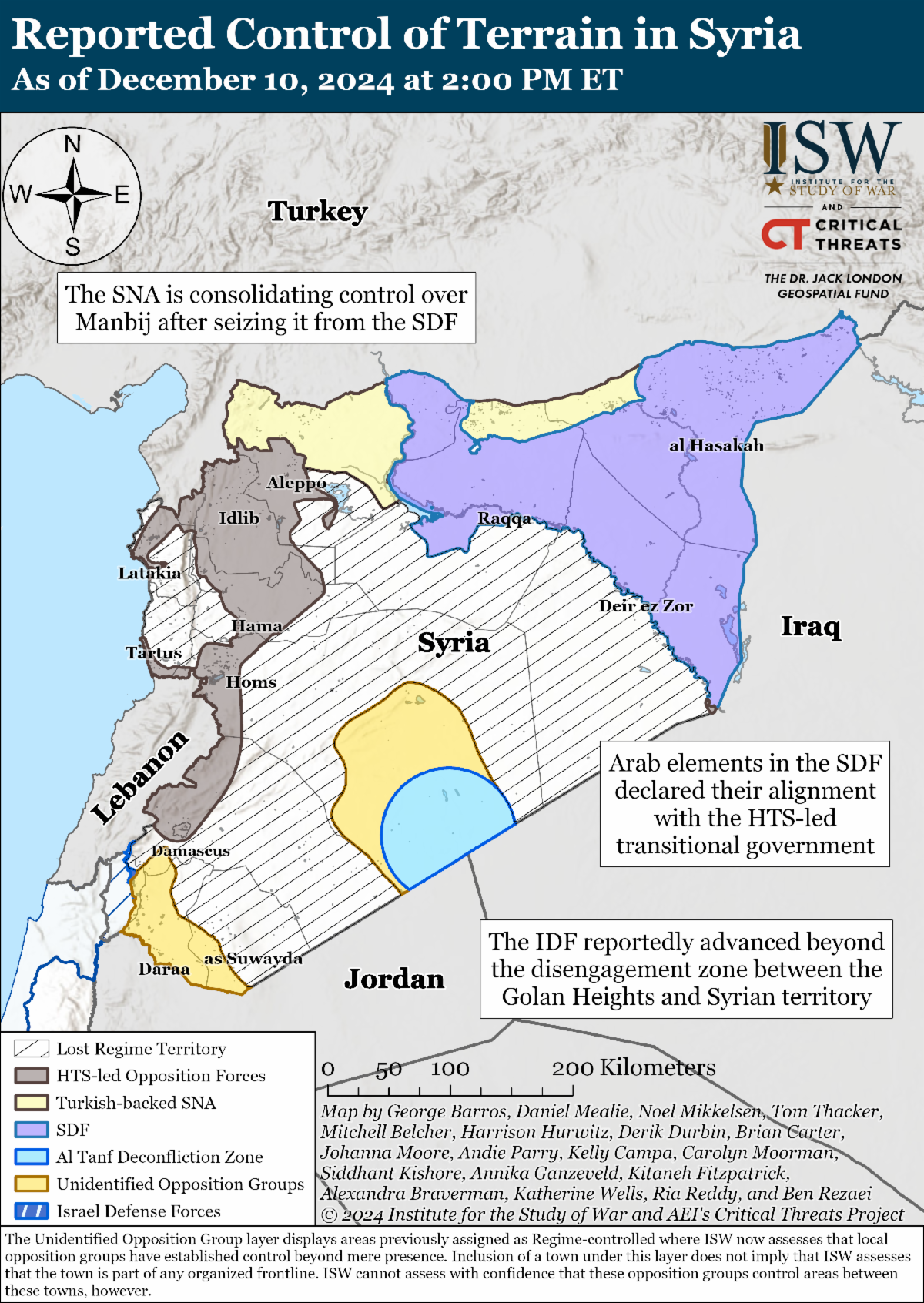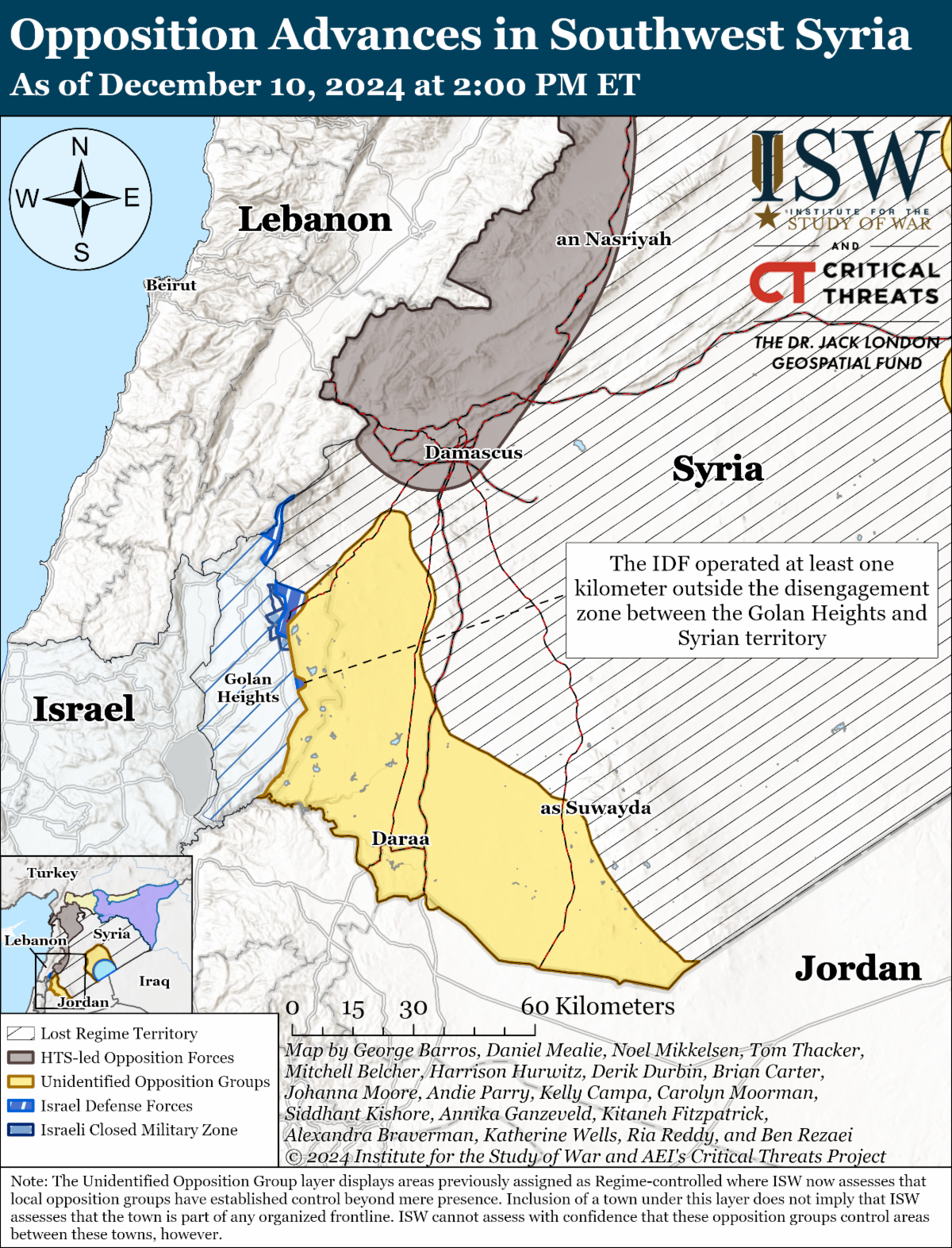Senior Syrian officials from the deposed Bashar al Assad regime have begun to transfer power to the HTS-led interim government as of December 10. Outgoing Prime Minister Mohammed al Jalili reported that former Assad officials are working with the interim government to preserve state institutions and government workers’ jobs. The chief executive of Sawsan Abu Zainedin—an umbrella group of 200 Syrian civil society groups—emphasized that the interim government would refrain from the “de-Baathification” of the Syrian state. CTP-ISW previously noted that Hayat Tahrir al Sham (HTS) likely recognizes that its own, smaller government apparatus in Idlib Province is ill-equipped to govern all of Syria and that it will need to rely on Syrian institutions at least for a period. US Secretary of State Antony Blinken voiced the United States’ support for a Syrian-led political transition leading to a ”credible, inclusive, and non-sectarian governance” in line with UN Security Council Resolution 2254.
Syrian media reported that the interim Syrian Salvation Government will conduct an assessment of the Syrian Arab Army (SAA) prior to its reorganization. This activity is part of a broader HTS-led effort to reconcile with members of the former Syrian regime and SAA. HTS announced on December 9 a general amnesty for all Syrian regime military personnel, whom the regime conscripted under compulsory service. HTS has similarly sought to integrate Syrian regime military and security personnel into civilian life in Aleppo City since seizing the city in November 2024. CTP-ISW previously noted that integrating former combatants into civilian life could help ensure security and stability during the post-conflict transition period.
HTS leader Abu Mohammad al Julani stated that “we” will hold former regime officers “accountable” for torturing civilians under Assad. Julani’s statement is alarmingly ambiguous regarding whether HTS or a new Syrian government will oversee the judicial proceedings for former regime officials. While it is necessary to hold former regime officials accountable for crimes committed against the Syrian people, HTS lacks the formal authority to prosecute regime officials. That authority should rest with a new Syrian government and constitution that have yet to be established or with an international tribunal. Julani may be reacting to pressure from hardliners in HTS, as there have already been reports of revenge killings in HTS-controlled territory. Revenge killings have historically exacerbated sectarian conflict, as seen in neighboring Iraq.
The Israel Defense Forces (IDF) reportedly advanced beyond the disengagement zone further into Syrian territory on December 9. Geolocated imagery posted on December 10 showed the IDF near Kudna, which is approximately one kilometer from the disengagement zone. Syrian media claimed on December 10 that the IDF advanced to the towns of Beqaasem, Erneh, Heeneh, and Rima in Damascus Province. Beqaasem is around 25 kilometers from Damascus. CTP-ISW cannot verify these claims. The IDF denied reports on December 9 that it is “advancing [toward] or approaching Damascus” and emphasized that the IDF is operating within the disengagement zone and at “defensive points close to the border.”
Key Takeaways:
- Syria: Senior Syrian officials from the deposed Bashar al Assad regime have begun to transfer power to the HTS-led interim government. HTS leader Abu Mohammad al Jolani vowed to hold accountable former regime officials for crimes against the Syrian people.
- Syria: The IDF reportedly advanced further into southwestern Syria. The IDF is also conducting a large-scale air campaign to destroy sensitive SAA capabilities that other armed Syrian groups could seize.
- Syria: Arab contingents in the US-backed SDF defected to the HTS-led interim government. These defections highlight the tenuous relationship that the SDF has with some of the Arab communities in its territory.
- Iran: Iran is trying to project continued confidence in its regional position despite the fall of the Bashar al Assad regime in Syria. This comes amid reports of infighting within the Iranian security establishment.
- Gaza Strip: Hamas indicated willingness to concede slightly on its maximalist demands in ceasefire-hostage negotiations with Israel. Hamas’ unwillingness to grant even minor concessions until now highlights its zealous commitment to fighting Israel.
| 







 [ISW] 러시아 공세 캠페인 평가, 2024년 12월 11일
[ISW] 러시아 공세 캠페인 평가, 2024년 12월 11일
 [ISW] 러시아 공세 캠페인 평가, 2024년 12월 10일
[ISW] 러시아 공세 캠페인 평가, 2024년 12월 10일